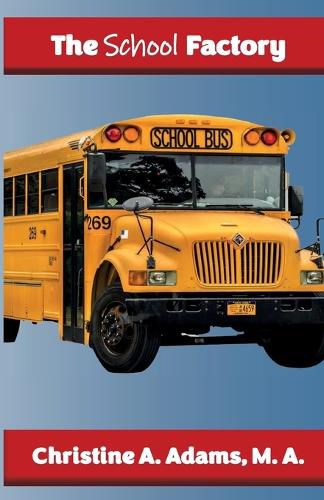Readings Newsletter
Become a Readings Member to make your shopping experience even easier.
Sign in or sign up for free!
You’re not far away from qualifying for FREE standard shipping within Australia
You’ve qualified for FREE standard shipping within Australia
The cart is loading…






This title is printed to order. This book may have been self-published. If so, we cannot guarantee the quality of the content. In the main most books will have gone through the editing process however some may not. We therefore suggest that you be aware of this before ordering this book. If in doubt check either the author or publisher’s details as we are unable to accept any returns unless they are faulty. Please contact us if you have any questions.
Written in the style of Mitch Albom's, The Five People You Meet in Heaven, The School Factory by Christine Adams switches time from present day, to the past and into the future. The commanding day is June 10th. The primary storyteller, Jenny Anderson, a loved senior English teacher. As the story opens, "Mrs. A." is in a head-on collision on her way to the graduation. In her unconscious state, she traces the year flashing back to events involving a dozen students. Their issues include illiteracy, early pregnancy, learning disabilities, crime, homosexuality, sexual perversion, racial bias, alcoholism and drug addiction. The conflict - their "real" human issues versus the "inhumane" school institution. By symbolically making all kids "products" tracked on different conveyor belts - in the factory, the author rips open the heart and soul of Heritage High.Throughout the novel, the conflict between the human needs of the teens and the rules of the factory builds. Some kids drop off the conveyor belt; one, Jim Bartlett, chooses suicide as his way out. In the last thread of the novel, the dying teacher meets Jim Bartlett. With Jim, now as her teacher, she experiences a true "TIMELESSNESS". She sees her students in their future lives. By expanding time, the author is able to help the teacher and the reader make sense of the incongruity and emptiness of a typical year in the school factory.
$9.00 standard shipping within Australia
FREE standard shipping within Australia for orders over $100.00
Express & International shipping calculated at checkout
This title is printed to order. This book may have been self-published. If so, we cannot guarantee the quality of the content. In the main most books will have gone through the editing process however some may not. We therefore suggest that you be aware of this before ordering this book. If in doubt check either the author or publisher’s details as we are unable to accept any returns unless they are faulty. Please contact us if you have any questions.
Written in the style of Mitch Albom's, The Five People You Meet in Heaven, The School Factory by Christine Adams switches time from present day, to the past and into the future. The commanding day is June 10th. The primary storyteller, Jenny Anderson, a loved senior English teacher. As the story opens, "Mrs. A." is in a head-on collision on her way to the graduation. In her unconscious state, she traces the year flashing back to events involving a dozen students. Their issues include illiteracy, early pregnancy, learning disabilities, crime, homosexuality, sexual perversion, racial bias, alcoholism and drug addiction. The conflict - their "real" human issues versus the "inhumane" school institution. By symbolically making all kids "products" tracked on different conveyor belts - in the factory, the author rips open the heart and soul of Heritage High.Throughout the novel, the conflict between the human needs of the teens and the rules of the factory builds. Some kids drop off the conveyor belt; one, Jim Bartlett, chooses suicide as his way out. In the last thread of the novel, the dying teacher meets Jim Bartlett. With Jim, now as her teacher, she experiences a true "TIMELESSNESS". She sees her students in their future lives. By expanding time, the author is able to help the teacher and the reader make sense of the incongruity and emptiness of a typical year in the school factory.